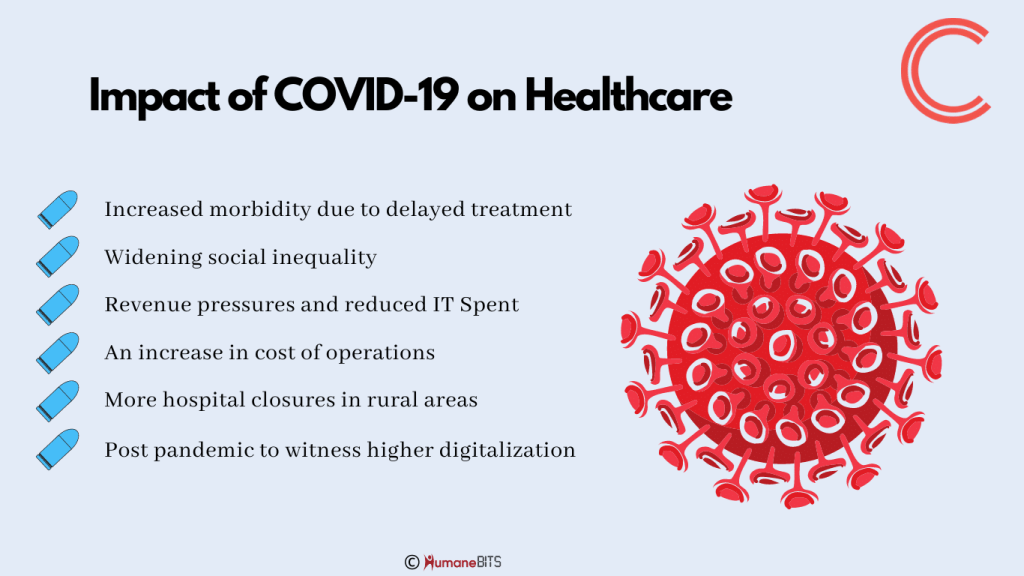The COVID 19 pandemic has brought healthcare providers and health systems to an unprecedented turning point, and its impact is likely to continue. Since drug availability determines part of treatment, from hospital beds’ availability to the distribution of vaccines, investment and supply chain changes will affect healthcare companies in the coming years. Existing shortcomings and inequalities in the health system have been exacerbated by lack of access to high quality, safe and affordable healthcare, and the high cost of healthcare.
Such changes will help to manage healthcare costs while improving the delivery of patient-oriented and high-quality care. General coverage would improve access to primary and preventive services, which in turn could reduce the risk of chronic diseases that exacerbate the health effects of disasters of this type. A comprehensive assessment of the impact of COVID 19 on health care in the United States would provide insights into the ongoing risks of a pandemic and the potential benefits of universal coverage.
When healthcare providers are severely affected by a COVID 19 pandemic, there are several setbacks that patients in dire need of medical care would suffer in accessing healthcare services. It is impossible to account for the impact of a pandemic on healthcare providers without considering the effect on the health system as a whole and patients’ access to healthcare.
The existing shortage of qualified workers is exacerbated by health workers at increased risk of infection due to COVID 19, mainly since most health systems are operated by Non -governmental organizations and not private health services.
Providers facing revenue pressures have limited scope to invest in the IT they need, and telemedicine is a sustainable change in the health system. Many insurers expect health costs to rise due to pent-up demand for deferred treatment and the direct costs associated with COVID 19, if vaccines are available to the general public by next year.

Insurers also expect increased morbidity due to delayed treatment, especially for patients with chronic conditions such as diabetes and heart disease. With hospital rates down by 9%, this could mean significant public health damage, as patients postpone life-long treatment – creating threatening conditions.
With the emergence of the COVID 19 pandemic, access to healthcare is perceived differently globally, as different countries have different health regulations. It turns out that governments around the world are affected in some way by the COVID 19 pandemics. Many experts spent countless hours assessing this outbreak’s impact, which has led to a significant increase in hospital admissions, hospital costs, and hospital closures.
The disease has highlighted inequality while exposing holes in the health system that can have lasting side effects for both patients and providers.
A robust framework will be needed to address behavioral health concerns while managing demand in the system and recognizing that we may not fully know the healthcare impact of COVID 19 for years to come. We must ensure that the number of people who do not reach a health facility does not escalate and that access to health care is further impeded.
Of course, there is no doubt that this pandemic will bring a new normal to health care, including oncology. As we saw first-hand during pandemics, digital solutions in healthcare can positively impact patients “lives. Pandemics can also accelerate healthcare consumption, as patients realize that they have access to a wide range of health products, services, and services that represent only a fraction of the cost of traditional care.
If adopted, the impact of deferred care will create new challenges for individuals and the healthcare system, which could add $30-65 billion to annual costs in the United States. While such reforms, such as those for providers “payments, could yield some savings by reducing healthcare costs, that amount is hard to predict. The number of people suffering from new diseases and existing ones such as cancer can further affect our health systems in the years to come.
The worst impact of the pandemic financially is likely to be felt by rural hospital systems, which have closed at devastating speed over the past decade. Others expect the pandemic costs, such as the loss of health insurance coverage, to have a “net effect” of zero. As pandemic recovery begins, we see two major opportunities ahead for the health system. COVID-19 could open the door to the increasing digitalization of medicine and highlight the devastating impact on our society’s health system so that improvements can be made by leaps and bounds. We see better prospects for the sector in the coming years.




